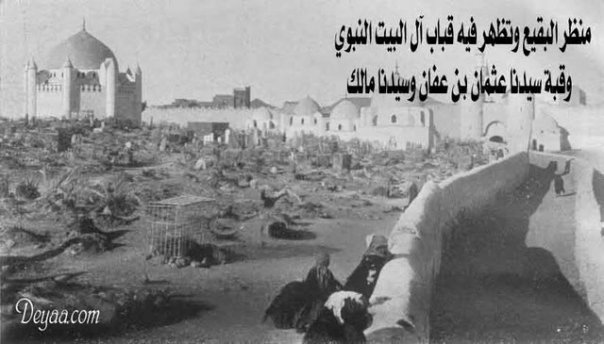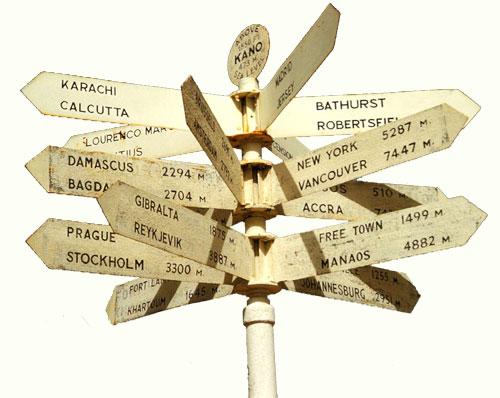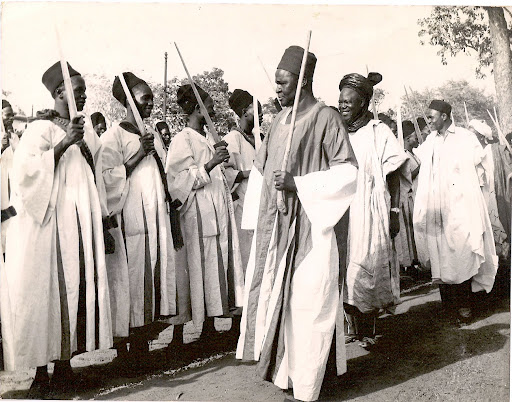by Alex Thurston
In 1999, Nigeria made global headlines when Northern states began re-implementing “full shari’a,” i.e. Islamic law codes that included criminal penalties for acts like theft, adultery, and drinking alcohol. The shari’a project in Northern Nigeria caused further controversy when shari’a courts sentenced two accused adulteresses to death by stoning – sentences that higher courts, under domestic and international pressure, later overturned.
As the rebel movement Boko Haram again puts Nigeria back in the headlines, the country’s relationship with shari’a is attracting new attention. Boko Haram’s overall platform remains vague. One of its few stated demands, however, is for broader and stronger shari’a not just in Northern states, but across all of Nigeria. What does this mean? And what historical factors have made shari’a loom so large in Northern Nigerian politics?
Looking at three key dates in Nigeria’s shari’a debates shows that for at least two centuries, the “shari’a question” has never been definitively settled in Nigeria. Additionally, the compromises reached by elites concerning the scope and meaning of shari’a at any particular time are likely, sooner or later, to encounter new factors that generate dissent, including at the fringes of society. At moments of crisis, dissent can feed violence.
Before tackling these topics, though, it will be helpful to discuss what shari’a in general might mean.
What Is Shari’a?
Like any complex religious topic, shari’a, Arabic for “way,” has different meanings for different people. For Sunni Muslims, who include the overwhelming majority of Muslims in Northern Nigeria, shari’a refers to a way of life based on the Qur’an, the actions of the Prophet Muhammad, the examples of the first generations of Muslims, and principles such as analogy, scholarly consensus, and public interest, as worked out over time by legal scholars. Different interpretations of shari’a emphasize, de-emphasize, or even exclude some of the above sources of law. In some understandings, shari’a is a comprehensive legal system that structures society and regulates criminal acts, social interactions, and individual practices.
Most Northern Nigerian Muslims follow the Maliki School of law, which looks to the eighth-century legist Malik ibn Anas as its founder and is the most widespread Islamic legal school in West Africa. Many Northern Nigerian Muslims who undertake a religious education grow up studying classical Maliki texts. Several state shari’a codes in Northern Nigeria explicitly proclaim adherence to Malikism.
Shari’a is not simply a code that legal scholars compose or that political authorities impose from above. It is also a set of institutions, practices, and negotiations that believers attempt to follow in everyday life, including as part of worship (washing oneself before prayer, for example, falls under the rubric of shari’a).
The rise of modern states has raised new questions about who has the authority to enforce shari’a, and how shari’a is to be enforced. Contests over the place of shari’a in modern societies have made it a plank in political platforms, a symbol for Muslim identities and values, and an object of intellectual debate. In Northern Nigeria it is all of these things. And since Northern Nigeria is part of a larger nation, these have become national questions in Nigeria.

Image of Janaat al-Baqi cemetery, Medina; burial site of Imam Malik, founder of the Maliki school of jurisprudence. Source: deyaa.com.
Three Key Moments for Shari’a in Nigeria
One major moment in the history of shari’a in present-day Nigeria occurred in 1804. In that year, Sheikh Uthman dan Fodio, a Fulani preacher, began a jihad against Hausa Muslim kings whose Islam, he believed, was deficient. Sheikh Uthman’s initially self-defensive war became one of conquest. The empire he established, the Sokoto Caliphate (so named for its capital, a city located in present-day Northwestern Nigeria), endured until the British conquered Northern Nigeria between 1897 and 1903. Dan Fodio and his heirs attempted to rigorously apply shari’a. The administrative structures of the Caliphate provided the basic institutions upon which the British built Indirect Rule; the application of shari’a continued, in a modified form, under colonialism.
Dan Fodio and his circle not only criticized the practice of Islam among Hausa kings in the Northwest, but also charged that the Muslim rulers of the empire of Kanem-Bornu, located in present-day Northeastern Nigeria, were insufficiently Muslim. This made the two empires rivals. The two regions have each retained distinct ethnic and political characters to the present day, and the heirs of Sokoto, rather than the heirs of Bornu, have been the dominant voices in setting patterns of Muslim authority in colonial and postcolonial Northern Nigeria. The Northeast’s marginalization, not only in political and economic senses but in the Islamic domain as well, may partly explain why Boko Haram arose there and not elsewhere. The relationship between Boko Haram and the Northeast’s traditional Muslim authorities is ambivalent – sometimes the sect has spared the lives of traditional leaders, but it has also assassinated royals whom it saw as enemies – but it is noteworthy that the movement has been slower to take hold in the Northwest, the former core provinces of the Sokoto Caliphate.
A second key date is 1960, when Nigeria became independent. British administrators had “amalgamated” Northern and Southern Nigeria in 1914, but they ruled the country’s two halves separately afterwards. Nigeria entered independence with a federal system that gave autonomy to the country’s three (later four) regions. As part of the political compromises that the North and South made with each other and with the British on the road to independence, Northern politicians devised the “Settlement of 1960.” Under this agreement, the criminal side of shari’a was abrogated, while in exchange a special Shari’a Court of Appeal was established for the Northern Region. The Settlement of 1960 limited legal application of shari’a to family matters, such as divorce and inheritance, during the next four decades. The Settlement was tested during constitution-making episodes in the 1970s and 1980s, but Muslim activists did not succeed in restoring criminal penalties, or establishing a federal shari’a courts, at these junctures.
The third important date is 1999, when the Zamfara State government reintroduced “full” shari’a. Zamfara’s decision took advantage of Nigeria’s federal framework. Nigeria’s regions were dissolved in 1967, and the country was broken into states. The current political system partly resembles that of the United States. This meant, under some interpretations, that Zamfara could implement shari’a within its own borders. Eleven other Northern states followed suit, though some governors proved more eager to bring back criminal penalties than others. Especially in the early stages, shari’a re-implementation received major grassroots support in Northern Nigeria. Muslims hoped the reform would end corruption, improve public morality, reduce crime, and restore accountability to government.
The re-implementation of shari’a, however, caused conflict. Muslims and Christians clashed in several Northern states. Shari’a became a campaign issue in 2003. At least one governor (Rabiu Kwankwaso, of Kano State) lost re-election in part due to perceptions that he had not pursued shari’a with enough zeal. The federal government brought legal challenges to shari’a implementation, including charges against individual personnel in Kano State’s Hisbah Board, a body dedicated to enforcing shari’a. The federal government, wary of state-level initiatives that would subvert its authority, was deeply suspicious of the shari’a project. Yet, unwilling to provoke serious unrest in the North, the federal government refrained from forcing the issue of shari’a’s constitutionality; state-federal conflicts, such as the appeals of the accused adulteresses and the imprisonment of Kano Hisbah personnel, resulted in compromises, and not necessarily in legal clarity.
The Shari’a Question Has Never Been Settled
These dates mark important events and symbolize important decisions, but equally important is what happened between them. Neither dan Fodio’s conquest, nor the Settlement of 1960, nor restoration of shari’a in 1999 resolved debates over the scope and meaning of shari’a in Nigeria. At each of these dates, “shari’a” became an object of political contestation. The compromises, changes, and reforms of each period pleased some parties and angered others. Even after dan Fodio applied shari’a in the Sokoto Caliphate, there were some who said that later rulers lowered the standards of public piety. After the British reformed the practice of shari’a, dissent and dissatisfaction lingered. After the Settlement of 1960, resentment grew among Islamist intellectuals and activists regarding the abrogation of criminal shari’a. The restoration of shari’a in 1999 drew attacks from the “spiritual left” of secularist Muslim intellectuals and human rights campaigners in the Western mold, but also brought complaints from hardline Islamists who felt shari’a was meaningless without a broader Islamic state as its guiding framework. Other Muslims argued that the personnel chosen to oversee shari’a were corrupt and ineffectual. Some still hoped to see all of Nigeria adopt shari’a.
Throughout these debates, shari’a courts have settled and mediated disputes, performed divorces, adjudicated inheritances and, when they have had the authority, meted out penalties for criminal convictions. Yet courts themselves have also at times become sites of political struggle – for example, when party politics heated up in the North during the independence period, Muslim leftists in the Northern Elements Progress Union sometimes strategically claimed Christian identities in order to remove themselves from the jurisdiction of what they regarded as shari’a courts controlled and subverted by the more conservative, and more powerful, Northern People’s Congress. More recently, higher courts’ decisions to overturn stoning sentences against accused adulteresses was likely a response to political pressure. The exercise and administration of shari’a in Northern Nigeria has sometimes been conditioned by the political climate of the moment.
Each major moment has also been transmuted into historical memory in complex ways, even if we restrict our discussion just to Northern Nigeria. Some Northerners remember the jihad of Sheikh Uthman dan Fodio as the glorious triumph of “true” Islam over the “insincere” Islam of “semi-pagan” kings. In this telling, dan Fodio’s implementation of shari’a symbolizes the victory of “true” Islam. Others understand the jihad as a form of ethnic warfare, or they see the Sokoto Caliphate’s practice of “shari’a” as one that failed to live up to the ideal.
The Settlement of 1960, meanwhile, is remembered in some circles as a sage compromise Northern elites made to secure independence for their country and autonomy for their region. Yet some Muslims see it as a moment when elites “sold out” Islam, and the historical heritage of the North, for the sake of political expediency.
Finally, for some, the re-implementation of shari’a after 1999 connotes the restoration of the glory of the Caliphate, and the revival of true Islam; for others it has failed to live up to expectations, and has not addressed core governance issues in Nigeria such as corruption, transparency, and accountability. Boko Haram’s members seem to feel that whatever was restored thirteen years ago, it was not “true” shari’a and did not go far enough, either geographically or politically.
Violent Dissent, Intra-Muslim Struggles, and Political Crisis in Northern Nigeria
Political struggles in Northern Nigeria have often been religious struggles as well. New leaders have often sought political and religious authority simultaneously. Dan Fodio’s claims to leadership derived from his personal piety and his stature as an Islamic scholar, as did those of his rival and contemporary Muhammad al Amin al Kanemi, a leader of Kanem-Bornu. Even the British, who worked closely with the aristocracy of the Sokoto Caliphate during colonial rule, partly based their authority on their willingness to “partner” with Islam. Ahmadu Bello, a descendant of dan Fodio and premier of Northern Nigeria from 1954 to 1966, was an elected politician but also an Islamic leader who led conversion campaigns inside Nigeria and helped found the Muslim World League. Today, the heirs of the Sokoto Caliphate and Kanem-Bornu continue to exercise both political and religious influence, while some elected politicians, like former Governor Ibrahim Shekarau of Kano State, have explicitly brought their Islamic values into policymaking.
The longstanding Islamization of politics in Northern Nigeria has meant that many movements of dissent articulate visions of Islam that are politically and theologically radical. These movements of dissent have been diverse, but one feature they share is that they have often surfaced at times of crisis. The British conquest of Sokoto was followed by a series of rebellions led by men who claimed to be the “Mahdi” – an Islamic eschatological figure who, it is said, will return near the end of time. In the 1980s, political and economic turbulence in Nigeria was a factor in the emergence of the “Yan Tatsine,” followers of a preacher who relied solely on his interpretation of the Qur’an and who banned the use of some modern technologies, such as bicycles. The 1980s also saw the appearance of the “Muslim Brothers,” who drew inspiration from the Iranian Revolution and called for an Islamic state in Nigeria. Both groups felt persecuted by authorities, leading to cycles of violence. The Yan Tatsine – whose adherents included a number of down-and-out youth – have been cited as a forerunner of Boko Haram, which seems to have a similar recruiting pool.
Boko Haram’s rise taps into major trends in Northern Nigerian history. Their radical theological and political stances and their use of violence hearken back to other groups that rejected the authority of government and the legitimacy of traditional Islamic rulers at moments when everything – politics, the economy, spirituality – seemed uncertain. Their desires for a strengthened and broadened shari’a reflect the disappointments some have felt with the version of shari’a that was restored in 1999. These desires also reflect the deeply unsettled position of shari’a in Northern Nigerian society and in the Federal Republic of Nigeria; in this way Boko Haram is part of a struggle that goes back more than 200 years.
Alex Thurston is a Ph.D. candidate in Religious Studies at Northwestern University. For 2011-2012, he is conducting dissertation fieldwork in Northern Nigeria. He blogs at http://sahelblog.wordpress.com.


